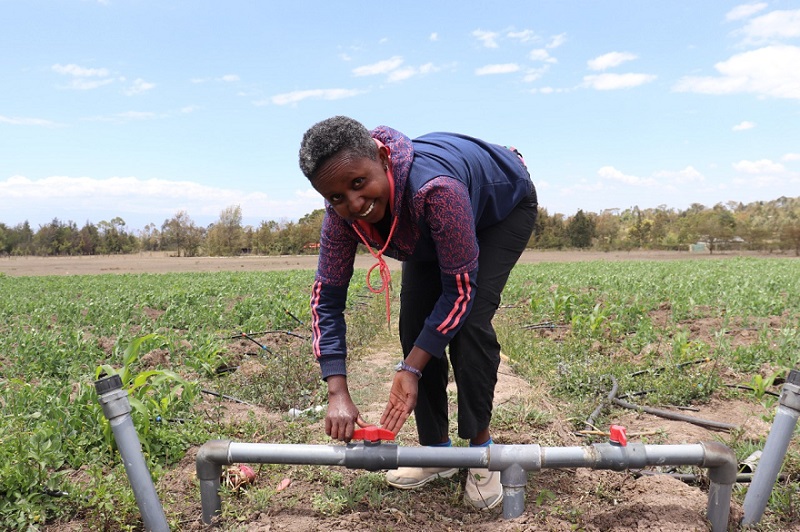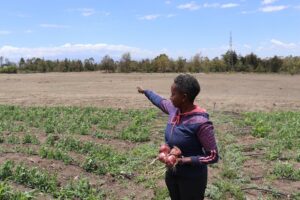
At the foot of Mount Kenya, about 170 kilometres (105 miles) north of Kenya’s capital, Nairobi, Kilima View, a beautiful farm with views of Mount Kenya and the Aberdare Ranges, brings life to the dry area with its green crops.
The farm was started by Phoebe Wanja, a former banker who quit her job four years ago to concentrate on farming. Born and raised in Nairobi, she developed an interest in agriculture during visits to her grandparents’ home during school holidays.
Her decision to quit her job at the bank in the city and make a move to agribusiness was a bold one. This is especially so because, in Kenya, agriculture is viewed as an outdated career, reserved for either the elderly or those who do not qualify for white-collar jobs and as a mainly male-dominated field.
While recent data by the World Bank actually places the percentage of women in agriculture in Kenya at 59 per cent, there is a huge disparity as most of these women work on farms either as labourers or are working on land that belongs to their husbands or that they jointly own.
Data by the Federation of Women Lawyers (FIDA) further stipulates that even though about 32 per cent of households in Kenya are under women, women in the country hold only 1 per cent of land titles on their own, while 5 per cent own land jointly with men. In Wanja’s case, like many women around Kenya, she farms on land jointly owned by her family.
“It was not until last year, when I got access to the international market, that commercial farming made sense to me. I don’t regret leaving my job in the bank, and I am comfortable and happy here,” says Wanja.
Recently, Wanja graduated from a training program on “Investing in Agriculture Value Addition” that was developed by USAID’s Kenya Investment Mechanism (KIM).
Delivered in partnership with Strathmore Business School, the five-day training program equipped women entrepreneurs with skills, knowledge, and tools to leverage opportunities in agro-processing and agribusiness value addition.
The training was informed by the results of a gap analysis conducted by KIM to identify and understand the reasons for the low rates of financing for women-owned SMEs (W-SMEs).

The analysis highlighted specific barriers such as a lack of business management skills and value chain-related challenges such as women operating in unprofitable value chains and a lack of access to information on value chain financing opportunities. A major recommendation from the analysis was the need to deliver targeted capacity building to women entrepreneurs aimed at strengthening their investor readiness.
As a result of the training, Wanja has learned how to formally run her farming business as a company and ways to raise capital to expand it.
“This was a very important training as it taught me how to keep books and actually run my farm as an established business. We were also taught how to pitch our businesses for funding opportunities,” she says.
As part of the training, KIM introduced the women trainees to financial institutions which would potentially provide funding for their businesses to expand and stabilize. Wanja was among three trainees who were invited to pitch their business ideas to invited financial institutions to see and gauge their skills training. After hearing her pitch, three banks have since been in touch to express their interest in financing her business for expansion.
The linkages to financial institutions came at an opportune time for Wanja. “My biggest challenge right now is access to sufficient water for farming. I’m sharing a borehole with a neighbour so the financing I receive will enable me to drill my own borehole so that I am not limited on how much water I can use to run the farm at any given time. I will also be able to expand the farm from five acres to about 12 acres so as to increase the farm’s production,” Wanja explains.
In the long run, she wants to buy her own land to farm on so that she does not have to worry about the land’s ownership or when her family will take back the land she is currently on.
According to Lucy Mitei, KIM’s Gender Specialist, the effects of climate change and the lack of access to resources by women are major barriers to success in agribusiness.
“In recent times, the consequences of climate change have been felt in different corners of Kenya, and the limited access to productive resources such as land continues to hinder meaningful participation of women in economic activities. However, KIM’s efforts to enhance access to finance for women in agribusiness will ensure consistent production and build their resilience,” she says.
As Wanja’s case shows, supporting Kenyan women in agribusiness to have equal access to finance – or resources – will enable them to expand economic opportunities in the sector and contribute significantly to the country’s nutrition and food security.












